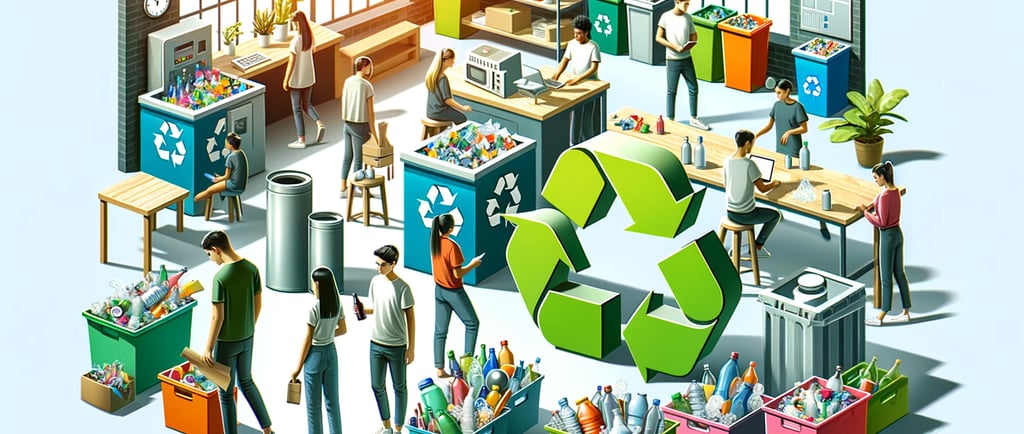"Empowering Youth: Recycling's Role in Climate Change"
Unlock youth power in climate action: transformative recycling habits for a sustainable, greener future. Read more now.
Musindo Kahonde
1/20/20242 min read


Introduction
In the fight against climate change, recycling stands out as a crucial weapon. It's not just about reducing waste; it's about transforming our approach to resources and energy. For the younger generation, who will inherit this planet, their role in this endeavor is not just beneficial but essential. This blog post delves into the significance of recycling in mitigating climate change and outlines actionable steps that youths can take to make a difference.
The Impact of Recycling on Climate Change
Recycling is more than a simple act of sorting trash; it's a powerful tool in reducing greenhouse gas emissions. By recycling, we cut down on the need for new raw materials, thereby decreasing the energy required for manufacturing. This reduction in energy consumption directly correlates to lesser emissions of carbon dioxide and other harmful gases. Moreover, effective recycling reduces the accumulation of waste in landfills, which are significant methane emitters, a potent greenhouse gas.
Recycling Actions for Youth
1. Educating Themselves and Others: Knowledge is power. Understanding what materials are recyclable and how the recycling process works is the first step. Youths can share this knowledge with peers, family, and community members.
2. Starting Recycling Initiatives in Schools and Communities: Youth can lead or participate in setting up recycling programs in their schools and local communities. This could involve organizing collection drives or collaborating with local recycling centers.
3. Creative Recycling and Upcycling Projects: There's a creative side to recycling – upcycling. Youths can engage in projects that give new life to old items, whether it’s crafting with used materials or finding innovative uses for everyday items.
4. Digital Recycling: With the rapid pace of technological change, electronic waste is a growing concern. Young people can advocate for and participate in programs aimed at recycling electronics responsibly.
5. Advocating for Recycling Policies: Encouraging active involvement in local environmental policies and practices is crucial. Youths can voice their support for sustainable policies and participate in community discussions on waste management.
Challenges and Solutions
While the path to effective recycling is promising, it’s not without its challenges. A common issue is the lack of access to recycling facilities or unclear recycling guidelines. Solutions may include working with local authorities to improve recycling infrastructure or creating informative campaigns to clarify recycling processes.
Conclusion
The role of youth in recycling is more than just participation; it's about leading a cultural shift towards sustainability. As they embrace and advocate for recycling, they set the stage for a more sustainable future, actively contributing to the mitigation of climate change. The journey is long, but with each step, the impact grows, paving the way for a cleaner, greener planet.
References
[1] GreenCitizen, "21 Practical Ways on How to Reduce Your Carbon Footprint," GreenCitizen.com, 2023. [Online]. Available: https://www.greencitizen.com/. [Accessed: Jan. 20, 2024].
[2] L. Wessel, "Easy diet changes can lower carbon footprint, according to Stanford Medicine-led study," Stanford Medicine News Center, Oct. 26, 2023. [Online]. Available: https://med.stanford.edu/news.html. [Accessed: Jan. 20, 2024].
[3] Phys.org, "How climate conscious Americans reduce their carbon footprints," Phys.org, Oct. 29, 2023. [Online]. Available: https://phys.org/news/2023-10-climate-conscious-americans-carbon-footprints.html. [Accessed: Jan. 20, 2024].
